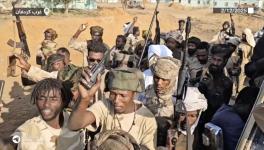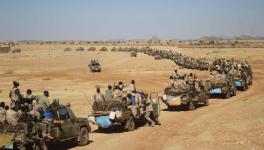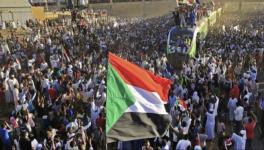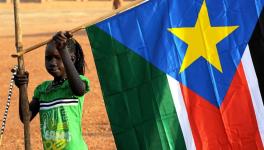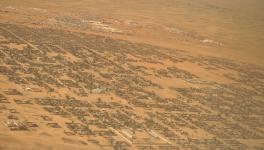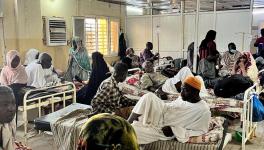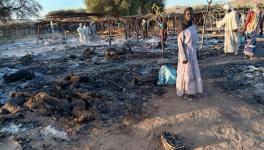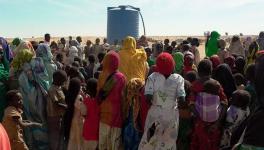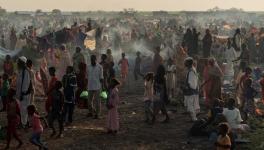Ten Killed By Security Forces as Millions in Sudan Reclaim the Streets
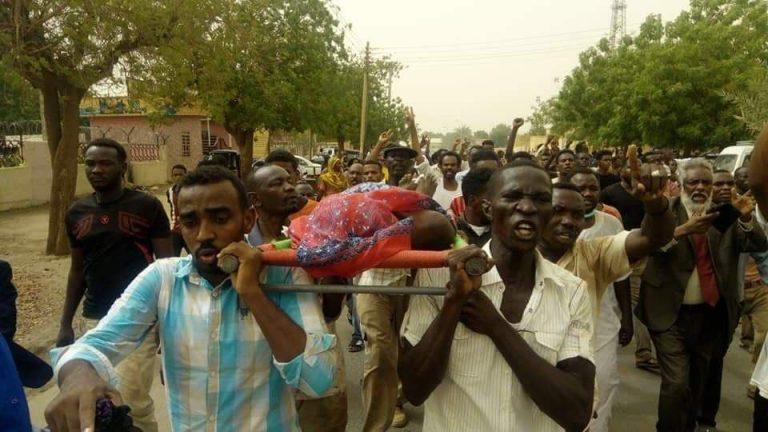
Protesters carry those killed during the protests in Atbara, River Nile State. Photo: Facebook
Millions of Sudanese took to the streets of towns and cities across the country on Sunday June 30 to demand that the military junta cede power and make way for civilian rule. The mobilization called the ‘Millions March’ was held on the 30th anniversary of the military coup in 1989 which has brought the now ousted president Omar al-Bashir to power.
The march was held nearly a month after the massacre carried out by armed forces on June 3. On that day, militiamen affiliated to the military junta cleared the mass sit-demonstration outside the army HQ in the capital city of Khartoum. They killed over a hundred, raped dozens, and injured over 700 protesters.
Sunday’s multitudinous march also saw heavy violence by Sudanese security forces. At least 10 have been confirmed dead and 181 injured. At least 27 of these injuries were caused by bullet wounds, according to the health ministry, although the real figure is likely to be much higher.
The list of injuries documented by the Central Committee of Sudan Doctors (CCSD), which is not exhaustive, shows well over 27 cases of gunshot wounds to head, thighs, legs, back, abdomen and other parts.
The Vice-President of the TMC, General Mohamed Hamdan Dagalo, who heads the RSF militia that carried out the June 3 massacre, blamed the gunshots on unknown “snipers” and claimed that his controversial Janjaweed militiamen had also sustained injuries. However, no credibility has been accorded to TMC’s version, and the protesters blame the military junta for the attack. Most other injuries were sustained after being beaten with sticks by the security forces and militiamen who had lined up on the streets in advance.
Such attacks were anticipated. Ahead of the march, the Sudanese Professionals Association (SPA), which has been at the forefront organizing the demonstrations, had cautioned in a statement: “The same Janjaweed militias and other security forces that resorted to the use of excessive force at the massive peaceful sit-in at the Army Headquarters in Khartoum on 3 June 2019 might use the same violent tactics against our people today.”
The TMC, on the other hand, had threatened by saying that protest movement will be “fully responsible for any spirit that is lost in this march, or any damage or harm to citizens or state institutions”. On the day before the ‘Millions March’, various members of the SPA and of the Sudanese Communist Party (SCP), many of whose members are a part of the SPA, were arrested.
The TMC also continued with the internet blockade, which was imposed on June 3 after the massacre, in order to cut off communication and make organizing difficult. Despite this, through a network of neighborhood committees set up across the country under the leadership of the SPA, youth distributed pamphlets to spread information about the protest call and to coordinate actions across the country.
In conversation with Peoples Dispatch, one protester reflected on the feeling he had as he set out on the march on Sunday in Khartoum, whose streets are still haunted by the memories of the June 3 massacre. He commented, “we were expecting [the] shootings to start the moment we start the marches. [But], at the same time, we were all aware that if we didn’t dare to step further, that would be the bitter end of all that we have been dreaming of [for] the last six months.”
“A heavy burden of individual responsibility towards the continuation of the revolution,” he said, helped them overcome the natural “human tendency” to hesitate in the face of “a very much expected massacre.”
Since April 11, when protesters forced Omar al-Bashir to step down, the army has been holding power through the Transitional Military Council (TMC). Protesters’ central demand is that there be a transition to civilian rule led by the Declaration of Freedom and Change Forces (DFCF) – an umbrella of political parties and unions which came together to represent the protesters.
Following the massacre on June 3, activity on the streets of Khartoum had remained minimal as the militiamen patrolled the capital city, terrorizing any civilian who dared to set out. As such apart from small demonstrations and actions of ‘barricade and run, all the bargaining power the civilian opposition held over the military junta in this period came from their ability to paralyze the country with strike actions and civil disobedience
The ‘Millions March’ on Sunday marks a milestone in the Sudanese revolution, where the protesters, whose positions had weakened after the sit-in was cleared, re-established their ability and willingness to mobilize outside the army HQ again, if needed.
https://www.facebook.com/ali.h.mohammed.96/videos/2616351148399781/
Get the latest reports & analysis with people's perspective on Protests, movements & deep analytical videos, discussions of the current affairs in your Telegram app. Subscribe to NewsClick's Telegram channel & get Real-Time updates on stories, as they get published on our website.









